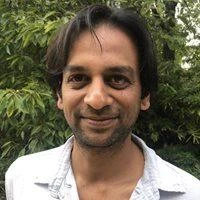
About
Dr Ram Bhat is Visiting Fellow and PhD alumni in the Department of Media and Communications at LSE.
Dr Ram Bhat holds a PhD in Media and Communications from the LSE Department of Media and Communications. Prior to this, Dr Bhat spent more than a decade working on media and communication (for) development in the Asia Pacific region, including a strong association with the community radio movement both in India and globally. In 2008, he co-founded a collective in India, Maraa working on arts in public spaces and democratisation of media. Throughout his career, he has taught media and communications at various educational institutions in India, and has consulted with a wide range of organisations on media and communications issues pertaining to tackling fake news, disaster preparedness, telecommunications and internet regulations, media ownership, digitalisation of television and radio, spectrum allocation, and universal service provision.
Dr Bhat's current research interests are to do with the links between communicative infrastructure, politics and subjectivation in the global south. His doctoral research employed discourse analysis, ethnography and semi-structured interviews to investigate the role of the National Optical Fibre Network in northern Chhattisgarh, India. He found that dominant castes upheld and reproduced the ideological discourses of development, transparency and modernisation associated with infrastructure. On the other hand, his findings indicate that when it comes to oppressed groups (Dalits, Muslims, Christian and non-Christian Adivasis), internet and indeed other infrastructures exerted control through everyday mundane procedures in the context of structural violence (mining, land grab, majoritarian religious terrorism/violence). However, he also found that in some cases, internet infrastructure produced a different register of violence and/or resistance that can be categorised as social haunting wherein infrastructural practices and objects are rendered incomprehensible or unfamiliar due to underlying structural conditions. Based on previous research related to WhatsApp and mob vigilante violence in India, Dr Bhat is working with Professor Shakuntala Banaji on a research project related to online hate speech in four countries: Myanmar, Brazil, India and UK for a book to be published in 2021. The research will involve in-depth interviews with online users discussing the socio-political contexts in these countries, the daily online practices within which hate speech is encountered, the affective and political consequences of facing hate speech and finally the legal and regulatory contexts around hate speech in these countries. In continuing with this research, Dr Bhat hopes to make theoretical and methodological contributions by focusing on the intersections between internet infrastructure (conceptualised broadly) and processes of governmentality and subjectivation. His focus will continue to provide empirically grounded research rooted in the global south, especially related to indigenous societies. Further, he hopes to contribute with original research from the global south on issues of hate speech and communicative technologies based on qualitative research methods drawing on users’ offline and online experiences and practices. Apart from the academic contributions, Dr Bhat's aim is to communicate his research more widely, making it useful to a wide range of actors and institutions – including media regulators, social media companies, critical media literacy activists and evangelical technologists.
Courses previoulsy taught: MC408, MC421, MC4M1.
Selected Publications
Books and book chapters
- Banaji, S. and Bhat, R. (2021). Social Media and Hate. London: Routledge.
- ‘Frequency and Spectrum Management for Community Radio in South Asia’ in Reclaiming the Airwaves: A Handbook on Community Radio in South Asia, Routledge (Taylor and Francis), ed. Malik, K. 2020.
- ‘Social Value of Spectrum’ in Claiming India from Below: Activism and Democratic Transformation, Routledge, ed. Mudgal, V. 2016.
Journal Articles
- Bhat, R. (In press). ‘Location of Infrastructure’ in Verge: Studies in Global Asias, A&Q section, Issue 6.2.
- Bhat, R. (2020). Critical research priorities: community radio in India. Media Asia. 45 (3), 77-88.
- Bhat, R. (2012). Television in India: The Starting Point in India for Digital Switchover. International Journal of Digital. Television, 3 (1), 73–83
- Bhat, R. (2012). Restoring Fairness. Economic and Political Weekly, 47(40).
- Frohlich, D, Bhat, R, Harwood, W et al. (2009). StoryBank: Mobile digital storytelling in a development context. In Conference on Human Factors in Computing Systems - Proceedings. https://doi.org/10.1145/1518701.1518972.
- Frohlich, D., Bhat, R., Jones, et al. (2009). Democracy, Design, and Development in Community Content Creation: Lessons From the StoryBank Project. Information Technologies & International Development, 5(4), 19–35.
Research reports
- Banaji, S., & Bhat, R. (2019). WhatsApp Vigilantes: An exploration of citizen reception and circulation of WhatsApp misinformation linked to mob violence in India. London. .
- Rantanen, T., Jaaskelainen, A., Bhat, R., Stupart, R., & Kelly, A. (2019). The future of national news agencies in Europe. London. https://doi.org/https://doi.org/10.21953/lse.aeginold23jj
Other writing
- Bhat, R. (2020). The intricate design of mediated mob violence. The Polis Project. https://www.thepolisproject.com/the-intricate-design-of-mediated-mob-violence
- Banaji, S. & Bhat, R. (2019). WhatsApp Vigilantes. Media@LSE. https://blogs.lse.ac.uk/medialse/2019/11/11/whatsapp-vigilantes-an-exploration-of-citizen-reception-and-circulation-of-whatsapp-misinformation-linked-to-mob-violence-in-india
- Bhat, R. (2018). Udikka, the child snatcher. The Wire. https://thewire.in/society/udikka-child-snatcher-rumours-lynching-dhule-assam
- Bhat, R. (2017). Aadhar and the dangerous road to universal basic income. Raiot. https://www.raiot.in/aadhar-the-dangerous-road-to-universal-basic-income/
Expertise
internet infrastructure governmentality and subjectivation; internet infrastructure hate speech and violence; qualitative methods in media and communication research; decolonising media and communications